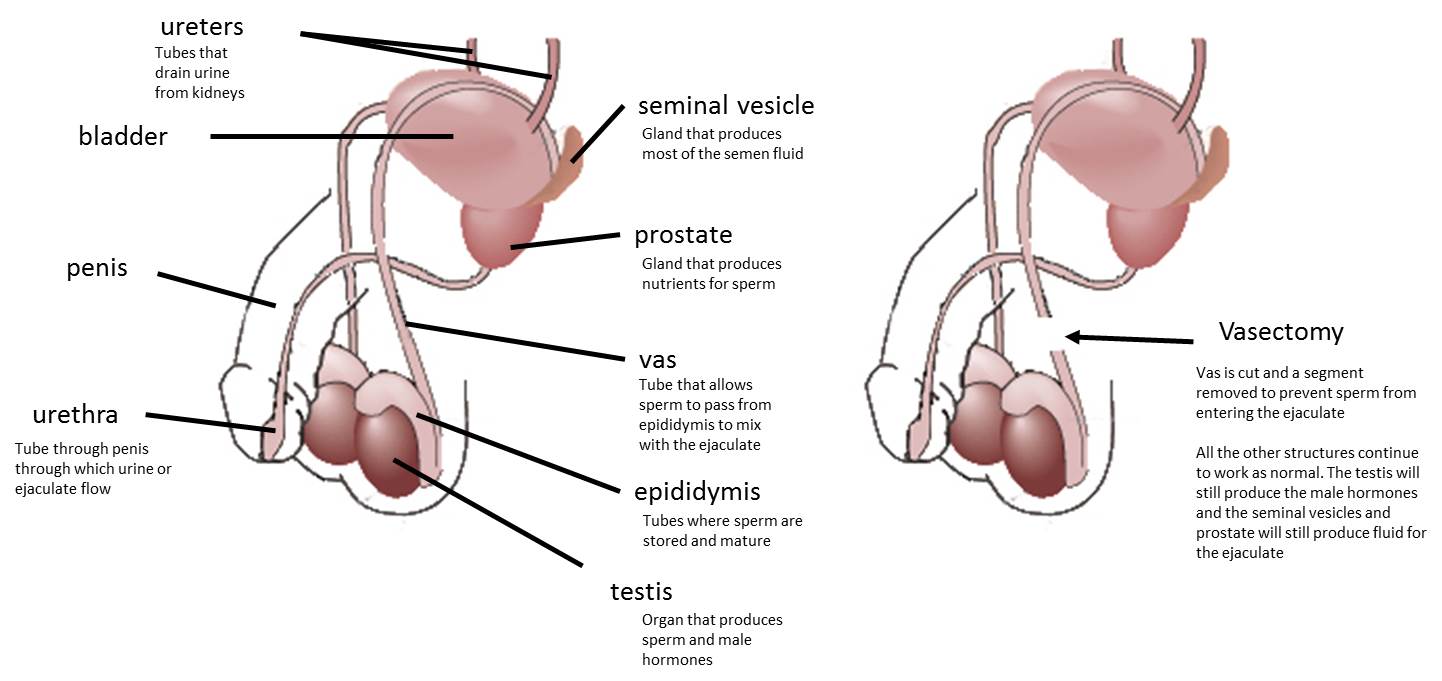Vasectomy is very reliable – but not quite 100%. Even after a successful operation about 1 in 2,000 men who have had a vasectomy will become fertile again at some point in the future. This is because, rarely, the two ends of the cut vas deferens re-unite over time. (When no contraception is used more than 800 in 1000 sexually active women will become pregnant within one year.) About 1 in 1,000 operations are not successful and tests show sperm are still present in semen after the operation.
We believe that this is the best method of performing vasectomy. It is neater, quicker and has been shown to have fewer complications than the traditional vasectomy.
No. The injection of local anaesthetic into the scrotum stings a little and then the area goes numb.
The pre-op counselling and examination takes about 10 to 15 minutes. The op itself takes about 20 minutes.
Any associated pain is usually mild and lasts for only a few days. Simple painkillers like paracetamol or ibuprofen are usually adequate.
Vasectomy failure means, that following a procedure and a sufficient time gap allowing for all sperm to die you still have life sperm in your semen. The chances are usually around 1:200. Once you have been cleared (negative semen sample at 4 months) the chance of a failure afterwards however is remote, probably 1:2000. Failure can happen due to different reasons. Provided the surgeon is experienced it is usually due to so called “spontaneous recanalisation” of the vas. This means the “tubes” grow together again following a procedure. If a failure happens your semen sample will not be negative, but contain live sperm. A repeat procedure would be required. Chance of failure can be higher due to previous surgery or injuries and the resulting scarring in a patient’s scrotum.
We prefer a GP referral so that you can have opportunity to discuss vasectomy with your GP first.
You should make arrangements for someone else to drive you home or to take public transport. The initial period after surgery is crucial for a recovery with little or no side effects.
While flying itself is not a problem, airports are usually stressful. You should preferably lie down, be reclined or at least rest sitting after surgery for 6 hours to minimise circulation and the possibility of side effects. For 48 hours you should do pretty little. You should not stand in an airport for hours or handle heavy luggage. You are therefore advised to avoid flying immediately after vasectomy.
We advise you to relax for 48 hours following your vasectomy and not to do any heavy physical labour for about a week. Otherwise you are free to return when you wish.
The only thing that will change is that you will not be able to make your partner pregnant. You will continue to produce the hormones (testosterone) that make you a man. You will have the same volume of semen in your ejaculate. Vasectomy won’t change your sex drive (libido), your erections, or your climaxes (orgasms). Some men say that without the worry of accidental pregnancy and the bother of other birth control methods, sex is more relaxed spontaneous and enjoyable than before.
No. It is very important to understand that you should use some other form of contraception until you are given the all clear following you semen analysis.
After a vasectomy, there are always some active sperm left in your system. You should ejaculate regularly either through masturbation or sexual intercourse (with alternative contraception) until your semen has been tested and you have been told that you do not have any sperm in your ejaculate.
As soon as you are comfortable, a week is probably a good guidance, but remember to use some other kind of birth control until we let you know you are sterile.
International experts from the National Institutes of Health (NIH) and by the World Health Organization (WHO), have concluded that vasectomy is a safe procedure. Research suggests that vasectomised men are no more likely than other men to develop heart disease, cancer, or other illnesses.
There is research evidence that a small percentage of men can get post vasectomy pain syndrome, which means they suffer some discomfort or an increased sensitivity in their scrotum.
No. Vasectomy will only prevent you from making your partner pregnant. If you or your partner have a sexual infection, or have more than one sexual partner, the best way to protect yourself and your partner is to use a condom.
Vasectomy should be regarded as a non-reversible procedure. Reversal operations are technically possible but they are not available on the NHS and are not always successful.



